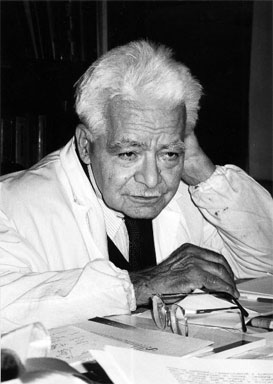| ABOUT US |  |
| FIND US |  |
| STATUTE |  |
| CHARTER |  |
| FINALITY |  |

Luigi Di Bella - Curriculum Vitae
Prof. Luigi Di Bella
Via Mariannini, 45
41100 Modena (MO)
Educational and professional background
Luigi Di Bella was born in Linguaglossa (Sicily) on July 17, 1912, the last of thirteen children.
He obtained his scientific high school leaving in Messina, then graduated in Medicine with honors on July 14, 1936 at Bari University. In the following years he graduated in Chemistry and Pharmacy.
His extensive knowledge combined with unique clinical experience allowed him to forerun - over thirty years in advance - therapeutic concepts that have only recently been understood and broadly recognized in scientific and medical literature.
In 1936 he also passed the state examination for license to practice the medical profession at Parma University and worked as assistant for three years at the Institute of Human Physiology.
In July 1939 he became ordinary assistant after passing the National Competition for assistant professors.
On September 3, 1939 he married Francesca Costa (who passed away on March 13, 1993). They had two children: Giuseppe (1941) and Adolfo (1947).
From 1939 to 1947 he was ordinary assistant professor of Human Physiology at Modena University.
In 1941 he left for Greece as captain of the Medical Reserve Corps, where he directed the field hospital of the 39th Acqui Division, and in 1942 of the 209th Modena Division. Since he contracted malaria, he was repatriated on September 4, 1943, and given a of discharge for health reasons.
In 1943 he was assigned the General Physiology Course for Natural Science, Biological Science and Pharmacy.
In 1948 he qualified for teaching Human Physiology and Biological Chemistry at university level, more specifically: General and Special Physiology of Domestic Animals with elements of Biological Chemistry; Human Physiology; and General Physiology. He was assigned Physiology I Fundamentals at Modena University, Faculty of Medicine.
He became a member of the Modena Medical Association, the Italian Experimental Biology Association (SIBS), the Italian Human Nutrition Association (SINU), the Italian Physiology Association (SIF), the European Chemoreception Organisation (ECRO), the European Pineal Study Group (EPSG), and the New York Academy of Sciences.
He attended and participated in numerous national and international symposia.
He retired in 1984 but continued his research activity in his own laboratory, where he also continued to visit his patients. In June 1990 he was awarded the Good Person Prize at the church of Villanova (Modena), for having treated his patients always for free.
He held symposia in several Italian cities where he illustrated the principles inspiring his method for treating blood diseases and solid tumors, which he had applied as early as 1966 in treating more than ten thousand patients.
Back to the Foundation


